An electric bass guitar, for the most part, is an inherently big instrument. That’s due to the larger scale length (typically around 34″) that bass guitar designers have, over the years, determined to be the optimum for factors such as overall sound and string tension.
This is quite a bit more than a standard electric guitar which, depending on the model, averages around 25”.
That said, it’s only natural for full size bass guitars to be more prominent, which can translate to them being heavier, awkward to handle, and harder to play for those with small hands or short arms. Not to mention that the extra size can make them a challenge to travel with.
So what’s the solution? A short scale bass guitar (which is often referred to as a ‘3/4 bass guitar’, or a ‘small bass guitar’).
Short scale bass guitars typically hover around the 30” mark for scale length, placing them right about in the middle between a full-sized bass and a standard guitar. They help minimize all of the issues we mentioned above, and they are relatively common in the market.
It’s important to note that any short scale bass guitar shouldn’t be regarded as a ‘toy’ instrument that isn’t worthy of professional players’ attention. In fact, some of the most famous bassists that have played prefer short scale models, such as Jack Bruce, Jack Casady, and Bill Wyman.
With all the models to choose from, the inevitable question is: ‘What’s the best short scale bass guitar available’?
Well that’s where we step in!
Because we’ve compiled a hitlist of what we feel are the 7 best short scale basses around, ranging from entry-level models to top-end instruments that would grace the guitar rack of any professional.
Read on to see what makes our shortlist!
Criteria
Before we dig in, we did judge our contestants for the best short scale basses by a list of essential factors:
- Body and neck construction
- Electronics configurations
- Hardware functionality
- Overall sound and playability
- Price point and value
If you’re strapped for time, we’ll let the cat out of the bag: in our assessment, the Sterling Stingray Short Scale Electric Bass has earned the distinction of being our Best Overall pick.
But, as with most things, opinions can be very subjective based on your individual preferences. We’d recommend taking note of all the models listed to see if a different model rises to the top for your needs.
1. Best Overall: Sterling Stingray Short Scale Electric Bass
Landing our choice for the Best Overall short scale bass guitar is the Sterling Stingray Short Scale Electric Bass.
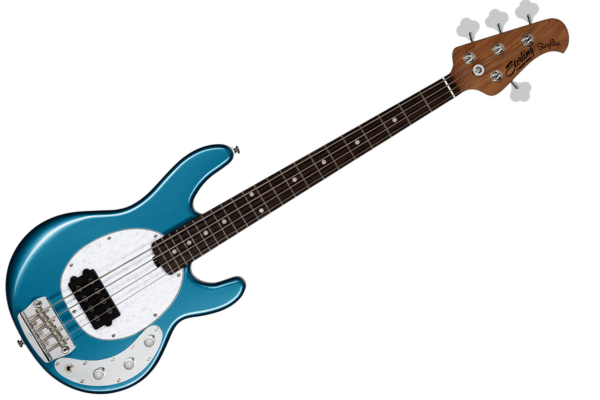
The Sterling by Music Man Stingray Short Scale Bass has the same familiar body shape that you’ll find on its iconic bigger brother. It’s constructed from a combination of nyatoh (a durable hardwood) and mahogany, and you have three finish colors to choose from (Daphne Blue, Dropped Copper, and Olympic White).
Hard maple is used for the 30” scale length neck, which is a great choice that not only offers strength and durability but has excellent vibration transfer characteristics as a tonewood.
Fingerboard options depend on what color you go for. Daphne Blue is maple while Olympic White and Dropped Copper are rosewood. All models come with 22 medium frets.
The electronics configuration is very flexible, featuring a neodymium humbucking pickup controlled with three unique knobs: volume (with a push/push pot for an overall boost), tone, and a three-way selector that lets you choose between series, parallel, or single-coil modes.
Often, the hardware used on a bass guitar in the mid-price range can be somewhat substandard, but that’s certainly not the case with the Sterling Stingray. The Sterling-designed bridge allows for individual intonation and string height adjustments, and the smooth action tuners have an open gear design for that vintage look.
Where the Sterling Stingray Short Scale shines is how it performs. The innovative three-way selector offers a wide range of tonal options that aren’t typically found on a bass guitar, and each setting provides a smooth, full, and balanced sound that is sure to please even the most discerning bassist.
One area that could have been better is the playability from the factory; some models may be prone to string buzz in the ‘off-the-shelf’ condition. That being said, it’s nothing that a good professional setup can’t cure.
Check out our Sterling by Music Man short scale bass review
The Pros
- A comfortable 30” scale length is an excellent choice for bassists that prefer a short scale instrument or for those that have smaller hands and body proportions
- The three-way selector switch, which controls the single humbucking pickup, allows for series/parallel operation while also having a coil-split option for single-coil tones
- Smooth playability puts it in the same league with instruments that can cost several times more
The Cons
- The factory setup could be better, as fret buzz and overall fretwork may need some attention
- No form of protection (either a case or a gig bag) is included, which is disappointing for an instrument that shines in many other areas
The Verdict
We have little reservation about this model earning pick for Best Overall short scale, particularly when you consider how well it rated for all of our critical points (quality, sound, playability, and price).
Who should consider this product?
For any bass player looking for a short scale bass guitar that checks all the boxes, the Sterling Stingray Short Scale bass, in our view, is pretty hard to beat.
2. Best Value: Ibanez GSRM20 Mikro
Ibanez has a long-standing reputation for producing excellent instruments all across their product line, and the GSRM20 Mikro short scale bass guitar is no exception.
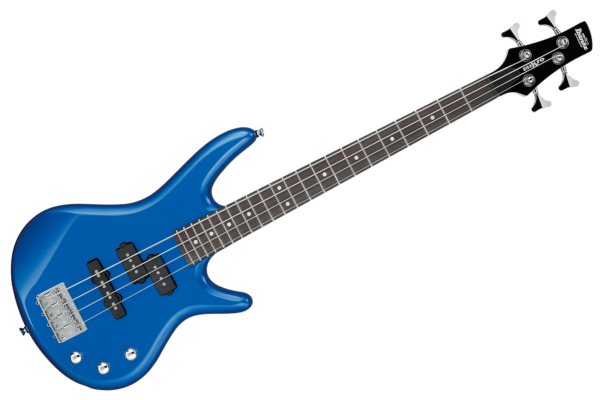
Poplar is the tonewood of choice for the GSRM20, and its attractive shape is nicely rounded with plenty of contours for comfort. You’ll have your choice of 7 finishes; each expertly applied with no flaws to be found. The maple neck is topped off with a Jatoba fretboard loaded with 22 medium frets.
The electronics on the GSRM20 are decidedly low frills, but you shouldn’t take that to mean less quality. Two Ibanez passive pickups (a Dynamix P for the neck and a Dynamix J for the bridge) offer an almost infinite range of tones thanks to the unique controls design. Instead of the typical pickup selector switch, the GSRM20 has a separate volume knob for each pickup, plus an overall master tone.
All of the GSRM20 models come with chrome-plated hardware as standard equipment. Individual adjustments for string height and intonation are easy to make with the B10 bridge, and the oversized knob tuners will hold your tuning stable.
So how does the GSRM20 function? Really well in our assessment. The control knob lets you find that perfect blend of the two pickups that best suits your tastes. Not that you necessarily have to blend them; they sound pretty good individually as well.
Playing the GSRM20 may take some getting used to due to its smaller scale length of 28.6” (even smaller than most of the 30” short scale basses on the market). At that dimension, you are getting close to a baritone guitar. But once you get into the groove, you’ll appreciate how well it plays as a whole.
The Pros
- A comfortable, contoured body that feels great and not overly bulky
- Individual volume knobs for each of the two pickups let you dial in your exact tone
- Exceptional value for the price point
- If you have a kid who wants to get into playing bass, the small scale could be a real plus point
The Cons
- May require a professional setup to minimize fret buzz
- Build quality is acceptable given the cost, but it could be better
- For some, 28.6″ may just be too small
The Verdict
For the price, the Ibanez GSRM20 is hard to beat. It’s a solidly performing short scale that won’t make a big hit on your budget.
Who should consider this product?
Guitar players who want to transition to the bass may find the ultra short scale length an easy way to make the switch.
3. Best Premium: Spector Bantam 4
While it’s true that most of the models on our list of the best short scale bass guitars are in the sub-$500 price range, there are then those models which are at the far opposite end of the scale, offering a premium instrument at a premium price. The Spector Bantam 4 is that model and, while it is expensive, you certainly get what you pay for. This is a top quality instrument.
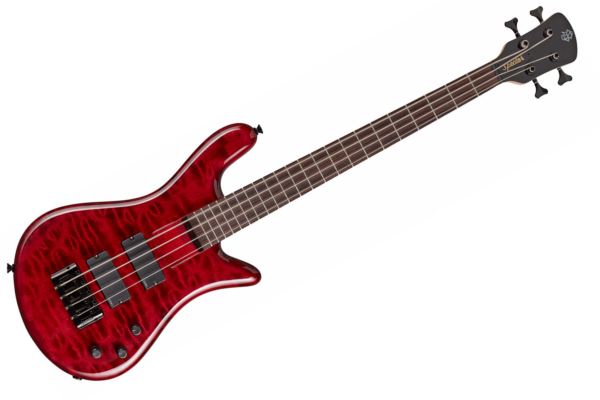
The Spector Bantam has a unique body design that would be hard to mistake for any other model. Its sleek NS body style is comprised of alder, and is chambered to bring out the best tone possible. Visually the Bantam is striking as well, offering four attractive and complex finishes over a quilted maple top.
A deep-inset design is used for the bolt-on neck, allowing for maximum vibration transfer. This is one of the most robust necks we have seen on a short (30”) scale bass, with a three-piece maple construction along with graphite rods for additional stability.
The Bantam is outfitted with dual EMG 35DC pickups along with the EMG BTS Active EQ Circuit. This unique configuration is controlled with single volume knobs for each pickup and a third knob with a stacked bass cut/boost and a treble cut/boost feature.
All of the hardware has an attractive black finish, and it’s certainly top of the line. A prominent feature is the Spector Aluminum Locking bridge design, which allows the individual saddles to be locked in place after they are adjusted to the correct position. Tuning machines on the Bantam are top-shelf as well, as it comes stock with high-quality Gotoh GB-707 sealed units.
Anytime an instrument has a price at the upper end of the spectrum, it’s fair to expect performance that matches. The Bantam has no problem whatsoever delivering where it counts. The tonal palette afforded by the EMG pickup/active onboard EQ circuitry is very pleasing, featuring impressive lows and highs that ring like a bell. It’s also extremely well-balanced and plays with minimal effort.
The Pros
- Chambered alder body for enhanced resonance
- Exceptionally stable maple neck, reinforced with graphite rods
- EMG pickups with onboard active EQ circuitry offers tonal sculpting beyond many competing models
- And yes – it comes with a gig bag!
The Cons
- The list price may keep it out of reach for many bassists with mainstream budgets.
The Verdict
Out of all the short scale bass models we have reviewed, the Bantam 4 is by far the most ‘professional level’ model on the list. But of course the price reflects that.
Who should consider this product?
Professional musicians looking for a short scale bass that offers top-end build quality, tonal options, and feature sets, regardless of budgetary concerns.
4. G&L Fallout Short Scale Bass
G&L is a guitar company that essentially rose from the ashes of the original Fender corporation, as Leo Fender himself launched it in 1979. The company has created an extensive product line over the years, and with the G&L Fallout, you’ll find a great short scale bass that isn’t short on features.
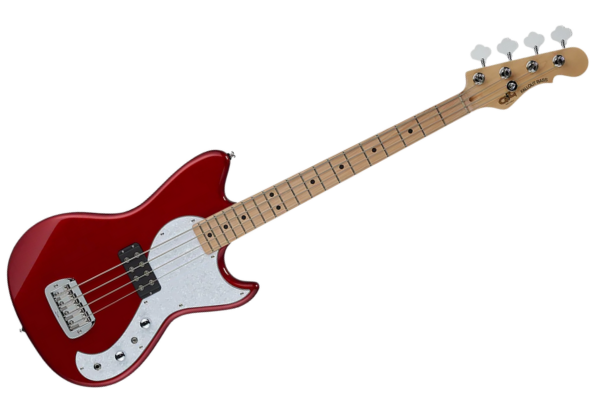
The ‘coolest short scale bass on the block’ (as per G&L themselves) comes with a double-cutaway alder body with four finish options to choose from (Tangerine Metallic is a particular favorite of ours). Alder is a great tonewood choice, heralding back to Leo’s preference to use it for the iconic Fender Stratocaster.
G&L has used a slim ‘C’ profile for the 30” scale length neck, ensuring that it’s comfortable to play. Hard Rock Maple is the material of choice, and the Fallout also offers the option of either maple or Caribbean rosewood fretboards.
While having the alternative is a good thing, we did find it kind of odd that you can’t get each fretboard style with each body color (i.e., you can’t get the rosewood board with the black or sunburst finishes, but only with the pink and tangerine).
The Fallout comes loaded with a G&L Magnetic Field Design humbucking pickup which offers three modes where you can coax parallel, split-coil, and what G&L calls ‘OMG’ mode out of it via a three-way mini-toggle switch. Single volume and tone knobs top off the electronics configuration.
Hardware on the Fallout is top-notch, with a Leo Fender-designed Saddle Lock bridge for precise intonation and action adjustments. Tuners are smooth and accurate with tapered shafts, and all hardware is chrome plated to match each of the finish options attractively.
The performance that you’ll get from the Fallout is undoubtedly impressive. Sonically, the three pickup settings genuinely do provide a nice palette to choose from, with the parallel settings sounding nice and full, along with the single-coil taking out a little bit of girth and sounding more focused.
The ‘OMG’ setting is what really impressed us – it adds a level of bass boost that turns this short scale into a complete tone monster.
As this is decidedly an ‘upper level’ instrument, it should be expected to have a playability level that matches its price. There’s no disappointment here, as the slim ‘C’ feels fast and helps the Fallout to be a joy to play.
The guy in this video clearly agrees!
The Pros
- Versatile. Three exciting pickup modes, including a beefed-up ‘OMG’ setting for extra bass presence without sounding muddy
- Four unique color finishes, with several fretboard options to match
- Fast slim ‘C’ neck profile for smooth playability
- Gig bag included
The Cons
- No quibbles in the sound department – but compared to others on our list, the price is in the higher range.
The Verdict
The G&L Fallout is an excellent sounding (and great playing) short scale bass guitar which would be a good addition to any bassist’s collection.
Who should consider this product?
Bass players who are looking for a good-to-great short scale bass and are OK with spending a little more to get a higher-end instrument.
5. Squier Affinity Series Bronco Bass
Squier is most notably known as Fender’s budget brand, but you may be surprised at what you get for your money. The Squier Affinity Series Bronco Bass is, in our eyes, a testament to that perception.
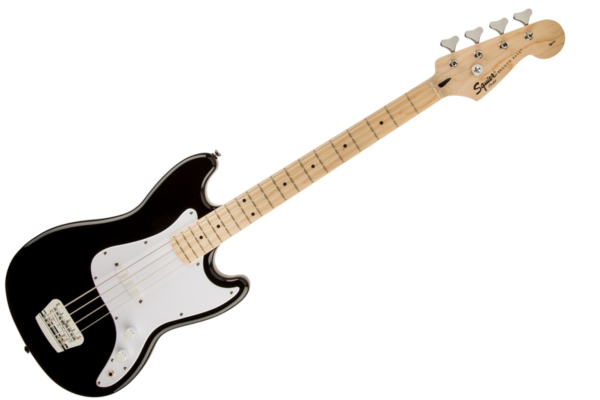
Let’s cut to the chase: the Bronco isn’t trying in any way, shape, or form to be something that it’s not. It lands squarely in the budget/entry-level category, with a relatively low frills feature set. The poplar body is somewhat similar to a smaller Fender P Bass shape, albeit with some different overall proportions.
Color choices are either gloss black or red, and maple is your only option for a fretboard on the maple neck (which clocks in at a 30” scale length, which is the most common dimension for short scale basses).
A solitary Squier Special Design Single-Coil is your pickup selection controlled by single volume and tone knobs. There aren’t any additional switches or EQ options here, which isn’t necessarily a bad thing per se. There are plenty of short scale bass guitars with better feature sets, but the Bronco’s simplicity can be viewed as a benefit.
We would have liked to see some additional flexibility with the stock bridge on the Bronco, as it has just a pair of saddles instead of having one for each string. This can create a challenge with getting intonation set right, and it also means you’ll have to tilt them in order to try and have string action follow the 9.5” fretboard radius.
If you keep your mind’s eye on what the Squier Bronco is meant to achieve, it pretty well nails it spot on from a performance standpoint. The single-coil pickup isn’t necessarily the fullest-sounding variant we’ve come across, but it’s functional enough not to sound too muddy or have an extreme top end.
The overall feel is relatively comfortable, thanks in part to the vintage-style ‘C’ profile on the neck and as a gateway instrument to all that playing the bass has to offer, it’s right on target.
The Pros
- Budget pricing makes it an excellent choice for beginner bass players
- Simplified electronics configuration keeps things on the easy side
- The 30” short scale is a great launching point for younger players who are just starting or for those that are looking for a quick and inexpensive bass to travel with
The Cons
- Overall, the single-coil pickup tone could be more robust, as the tone controls do not make a huge impact
- Quality level is to be expected from a bass targeted at this market level
The Verdict
The Squier Affinity Series Bronco Bass certainly isn’t going to masquerade as a high-end, professional level instrument, but we feel it does the job it was intended to do – offer an entry-level short scale bass with a reasonable level of quality.
Who should consider this product?
The Bronco would be an ideal short scale bass guitar targeted at beginners, particularly those that may not want to invest a lot of money at the start of their playing journey.
6. Epiphone Viola Electric Bass
We can’t help ourselves here: if you want to say ‘yeah yeah yeah’ to an excellent short scale bass, then the Epiphone Viola Electric Bass is the one that ‘wants to hold your hand’ (apologies for the relatively lame Beatles references…but work with us here…it’s been a long day at the office)!
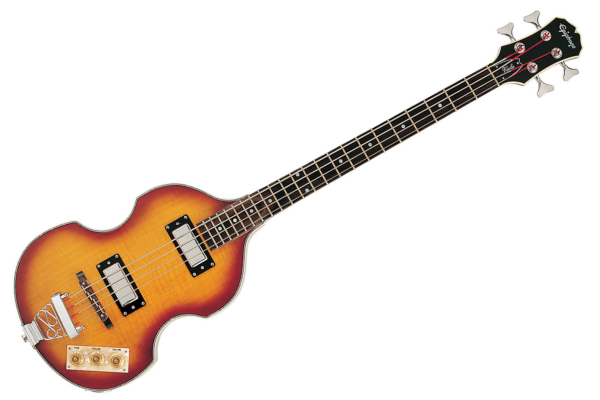
No, the Epiphone Viola isn’t intended to be a Paul McCartney signature model in any way. Still, there aren’t too many other bass players with a particular bass designed associated with them (besides…Paul played a Hofner). Regardless, the complete vibe is all-inclusive with the Viola, as its vintage sunburst body is a relatively faithful simulation that harkens back to the British Invasion.
The 30.5” short scale length afforded by the maple neck is just a touch longer than most of the short scale bass guitars on our list. Epiphone’s SlimTaper profile provides just the right feel, and the Okoume (an African hardwood) fingerboard is home to 22 medium jumbo frets.
The Viola comes standard with two humbucking pickups: an NYR for the neck and an NYT for the bridge. Each has its own dedicated gold top hat volume knob, along with a single master tone control.
Vintage mojo abounds on the Viola, with a Viola Scroll tailpiece along with a compensated bridge. While this bridge may be period correct, the only adjustment available is overall height by adjusting each end (similar to a Tone-O-Matic); we would always prefer to have more individual control. The sealed Epiphone tuning machines are solid and afford stable tuning.
Sound-wise, the blending feature on the Viola is well appreciated, as it is a great way to enhance and craft a custom sound that isn’t wholly dependent on a particular pickup being ‘on’ or ‘off.’ While it may not be the most well-balanced bass (violin style’ basses are prone to neck dive), it’s relatively lightweight and comfortable to play.
This is a typical manufacturer’s video but it does give a pretty good overview of the features.
The Pros
- A vintage visual design reminiscent of the 1960s
- Blending control over the dual humbuckers offers enhanced tonal flexibility
- Lightweight and easy to play
The Cons
- Compensated bridge design does not accommodate individual string height or intonation adjustments
- The overall sound profile is somewhat smooth and relaxed, so it may not be the best choice for anyone looking for a more aggressive tone
The Verdict
Once you get past the novelty factor, the Epiphone Viola is a solid short scale bass with a fair asking price.
Who should consider this product?
Any bassist that prefers a short scale bass while having a little vintage fun thrown it at the same time.
7. Gretsch G2220 Electromatic Junior Jet Bass
Gretsch guitars have a vibe that’s all their own, which isn’t duplicated by any other manufacturer that immediately comes to mind. That impression rings true with the G2220 Electromatic. It’s a prime contender for possibly being the best short scale bass under $500 we’ve come across.
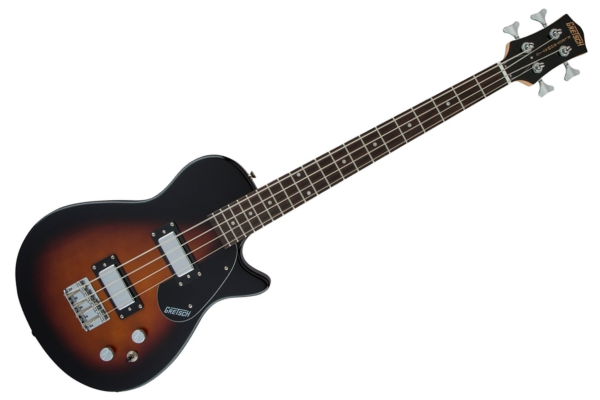
The G2220 features a basswood body that owns a design that is unmistakably Gretsch. The single-cutaway profile comes in your choice of three impressive finishes. Additionally, as the G2220 is a short scale bass, the overall body size is somewhat smaller to accommodate, resulting in no bulky or awkward feel.
As far as the neck is concerned, it’s constructed from maple with a gloss urethane finish. It has a striking black walnut fingerboard with 20 medium jumbo frets, and it has decidedly simple Pearloid dot inlays for the fret markers.
Two Gretsch Mini Humbuckers power the G2220, which are controlled via a master volume, a master tone, and a three-way selector switch. This is a fairly standard setup for guitars with two pickups, but many basses offer a way to blend the two pickups. It’s not a dealbreaker by any means, but it reduces the amount of flexibility you have to craft your sound.
Regarding the hardware, it’s highly functional with a fully adjustable bridge (individual saddles for height and intonation). Tuners are sealed die-cast units that offer precise tuning adjustments, and the G2220 is topped off with a black pickguard with a Gretsch logo and ‘G arrow’ knobs for the volume and tone.
The G2220 offers a 30.3” scale length, which fits right in with most of the short scale basses you may come across. Playability is a crucial factor, as the factory setup appears to be spot on right out of the box.
From a tonal standpoint, the Mini Humbuckers are just hot enough to give you a little grit if you get aggressive while also providing a warm bottom end if you just like to lay back a bit.
The Pros
- Distinct Gretsch body design and vibe
- Arrives well-setup from the factory, affording excellent playability with a minimum of adjustments
- Overall price should fit into the budget of most bassists while providing high value
The Cons
- We would have liked to see a pickup control scheme that allowed for blending each of the humbuckers
- Shallow neck profile and string spacing may take some getting used to at the outset
The Verdict
The G2220 is a very capable short scale bass guitar which would be a welcome addition to your bass arsenal, all at a great price.
Who should consider this product?
Anyone who craves the vintage retro feel of a good Gretsch guitar, all in a short scale bass.
The Bottom Line
While some may look at short scale basses as a ‘kids’ instrument, nothing could be further from the truth. The models we put under the microscope in this review range from those targeted towards beginners of any age on a budget (Squier Affinity Series Bronco) to an impressive professional-level bass (Spector Bantam 4 – our Best Premium pick).
All of these bass guitars are instruments worthy of your consideration, but some of them do stand out above the others. In our view, the Sterling Stingray Short Scale Electric Bass is our choice for Best Overall, as it is the model on our list which most possesses that ideal combination of features, performance, and price point.

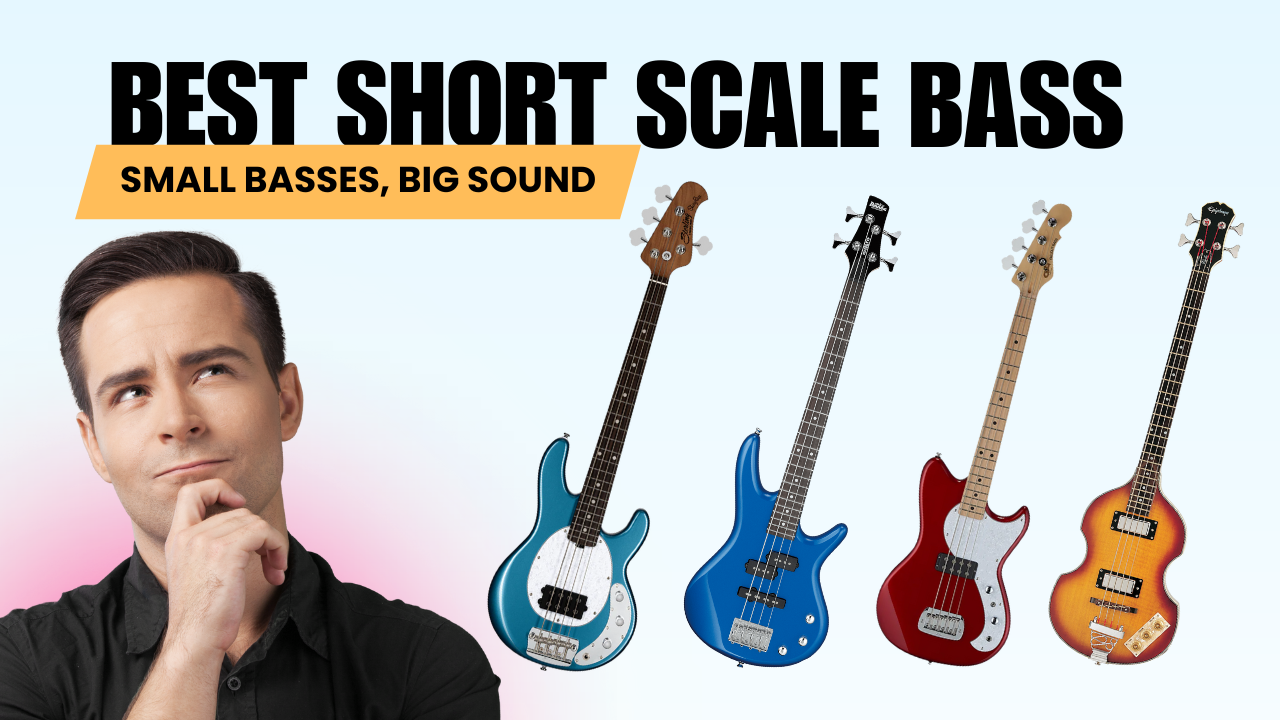


Ibanez makes the only 5 string short scale?
No, Ibanez is not the only manufacturer that makes 5-string short-scale bass guitars, but they are one of the most notable brands offering such models. Several other companies also produce 5-string short-scale basses, Squier, Gretsch, Kala, Warmoth